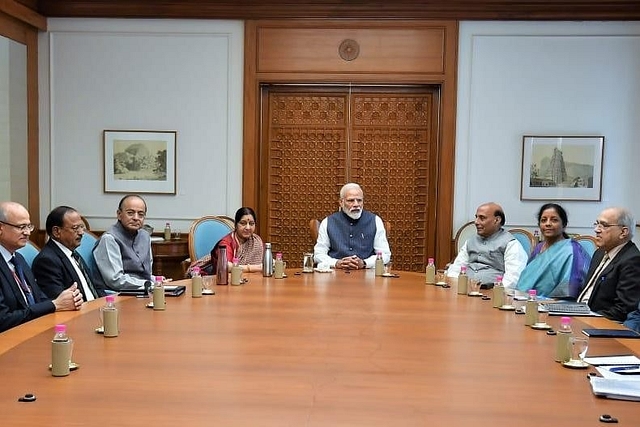
Iron Fist: How To Decode The IAF Attack On Jaish Bases Inside PoK And Pak
The surgical strike and the IAF attack on Balakot have changed the game. The ball is now in Pakistan’s court. It can blink, or escalate, and we have to be prepared for both.
The strike on Jaish-e-Mohammed (JeM) training camps on the other side of the line-of-control by the Indian Air Force (IAF) early today (26 February) has to be decoded in multiple ways.
You can also read this article in Hindi- पाकिस्तान और पीओके में जैश अड्डों पर हवाई हमले में छिपे गूढ़ अर्थ
First, and the most obvious, is the fact that the terror infrastructure has been targeted both in Pakistan-occupied Kashmir or PoK (Muzaffarabad and Chakoti) and deep inside Pakistan (Balakot). India has thus crossed the Rubicon it had set for itself in the Kargil war, that it will not cross the Line of Control (LoC). We are not anymore restricting counter-terror action to Indian territory, or even PoK, but gone into Pakistan proper.
Second, the use of the IAF this time makes it clear that our surgical strikes will not be restricted to ground action alone. Other means will be adopted when appropriate.
Third, while the strike against the Balakot terror training camp is retaliatory in nature, given the context of the Pulwama JeM suicide attack on a Central Reserve Police Force (CRPF) convoy, the government this time asked the Foreign Secretary, Vijay Gokhale, to brief the media about it. In the post-Uri surgical strike, when a special force crossed the LoC to attack a couple of terror staging posts in PoK, it was the army which held the briefing. The difference between the two briefings is that one indicated the military nature of the surgical strike, while the IAF bombing today is being explained by the diplomatic corps.
Fourth, Gokhale’s briefing mentioned two important phrases – that the strike was “non-military” and “pre-emptive”. The meaning of the word “non-military” is that we are not going to war with Pakistan, and we are not seeking an escalation. We are only going after terrorists, people who are targeting us. We are not targeting Pakistan.
Fifth, the use of the phrase “pre-emptive” implies that India is not taking revenge for the Pulwama suicide attack on 14 February, which killed more than 40 CRPF personnel. Instead, it is taking action to prevent future attacks. This is a coded message with double-meanings for Pakistan and the global audience: it means we will not be reactive in future, and can take action in advance of a threat materialising. It is also a simple riposte to Imran Khan’s offer to investigate the Pulwama attack if there is “actionable evidence”. By bombing the JeM training camp, one to which JeM boss Masood Azhar’s brother-in-law Yusuf Azhar was linked, the IAF has asked Imran Khan to look for actionable evidence in the rubble of Balakot.
At another level, it also sends a gentle message to the global community that India is only doing what any other country would have done in such a situation: protect itself. If the international community, including China, does not want an escalation of tensions between two nuclear nations, they must pitch in to restrain a rogue nation like Pakistan from supporting terror groups like JeM.
Sixth, the media failed to take note of a statement by Narendra Modi in an interview to ANI on 1 January. In that interview, he was asked why Pakistan’s behaviour had not changed after the post-Uri surgical strikes, and Modi’s reply was simple: “Ek ladai se Pakistan sudhar jayega, yeh sochna bohot badi ghalti hogi. Pakistan ko sudharne mein abhi aur samay lagega.” (It is a mistake to think that Pakistan will change after one attack. It will take time to change Pakistan).
The import of that innocuous statement is only now apparent. It implies that the PM knew more actions were needed, and the government was waiting for the right time to implement them. Pulwama provided the trigger, and the IAF went in to do the job.
To be sure, we have demonstrated that we can strike deep inside Pakistan, and that sends its own message. But we would be foolish to think that Pakistan will not escalate, or not do some other things to salvage its wounded pride. We have to be prepared for two possibilities: one is an escalation of suicide attacks in Kashmir and elsewhere; the other is something similar to what we did on Balakot, a strike at an important strategic asset inside India.
The surgical strike and the IAF attack on Balakot have changed the game. The ball is now in Pakistan’s court. It can blink, or escalate, and we have to be prepared for both.